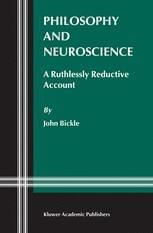From the reviews:
“If you thought reductionism about the mind was dead, think again: you may find John Bickle’s vigorously and powerfully argued Philosophy and Neuroscience: A Ruthlessly Reductive Account a real eye-opener. His guiding idea is that the proof of reductionism is in the track record of reductionist research strategies in neuroscience, in explaining mentality and behavior — and even qualitative consciousness itself. And Bickle does not disappoint: he serves up a veritable feast of reductionist success stories, from deep down in cellular and molecular neuroscience. Some of the details he describes will amaze, and perhaps also delight, you. Bickle’s discussion is invigorating as well as philosophically sophisticated, and his knowledge of current research in neuroscience is impressive indeed. The writing is clear, brisk, and refreshingly straightforward, and the book brims with enthusiasm and optimism. This is the latest salvo from the reductionist side, and a mighty one it is! It may not win the battle outright for reductionism, but it is going to change the shape and terms of the debate to come. A must read for those interested in the issues of psychoneural reduction and reductionism, and highly recommended to anyone with a broad interest in the philosophy of mind and psychology.” (Jaegwon Kim, Brown University)
“Bickle now practices metascience … a large part of the book consists of neuroscientific case studies. … Bickle’s experimental cases are fascinating and his book qualifies as a showcase of naturalism in the philosophy of mind. As such it deserves to be read by any philosopher with naturalistic leanings. … Bickle has provided food for thought. … It manifests a profound respect for empirical developments, and a healthy criticism of philosophical hobbyhorses and entrenched reasoning patterns. This makes the book worthwhile reading.” (Huib Looren de Jong and Maurice K. D. Schouten, PhilosophicalPsychology, Vol. 18 , 2005)
